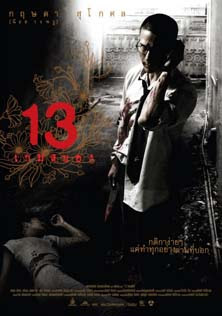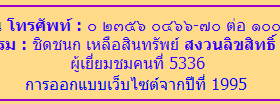So imagine my delight when I discovered this grade 3 school book, copyrighted 1944. It's called แบบเรียนภาสาไทย หนังสืออ่านภูมสาตร เล่ม 1, "Thai Language Textbook: Geography Reader Book 1". Here is the cover:
 The text of the cover reads:
The text of the cover reads:แบบเรียนภาสาไทย
หนังสืออ่านภูมิสาตร เล่ม 1
สำหรับชั้นประถมปีที่สาม
ของ
กรมสามัญสึกสา
กะซวงสึกสาธิการ
หนังสืออ่านภูมิสาตร เล่ม 1
สำหรับชั้นประถมปีที่สาม
ของ
กรมสามัญสึกสา
กะซวงสึกสาธิการ
I've marked the words with modified spellings in red. It's interesting to see just how much of the redundancy of the Thai writing system is retained, especially when you compare it to an extreme case of simplified orthography, modern Lao. Based on reading a few pages of the text, I've observed the following changes in simplified Thai:
- All of วรรค ฎ (i.e. ฎ ฏ ฐ ฑ ฒ ณ), the section of the alphabet corresponding to the Indic retroflex consonants, is gone, being replaced by their corresponding consonants in วรรค ด (ด ต ถ ท ธ น).
- ใ is uniformly replaced with ไ.
- ญ is replaced with ย in initial position (e.g. ใหญ่ > ไหย่), but retained in final position without its 'base' (ฐาน), as seen on the title page in the word สามัญ.
- Of the three high /s/ consonants, ศ ษ ส, only ส is retained (e.g. ศึกษา > สึกสา).
- Initial /s/ cluster ทร is replaced by ซ (e.g. กระทรวง > กะซวง).
- The leading อ in the four words อยาก อย่า อย่าง อยู่ is replaced by ห.
- Many consonants that don't add to the pronunciation are eliminated (e.g. จริง > จิง, ศาสตร์ > สาตร).
- Some clusters are reduced (e.g. กระทรวง > กะซวง).
I've only included the image of the first page, but I've typed up chapter 1, which is three pages long. As above, simplified spellings are in red, and spellings that differ from modern spellings (but not because of this simplification) are in blue.
บทที่ 1
พระอาทิจ คือลูกไฟดวงไหย่
1 วันหนึ่งไนรึดูร้อน เด็กหลายคนนอนเล่นหยู่บนหย้าโคนต้นมะขาม วันนั้นร้อนจัดมาก จนเล่นอะไรไม่ได้ เด็กเหล่านั้นพากันบ่นต่าง ๆ นานา มีเด็กชายฝืดคนเดียวเท่านั้น ที่ชมว่าเปนเวลาเหมาะและสบายดี เพราะว่าร้อนจัดไม่ต้องทำการอะไร
2 ไนทันไดนั้น พวกเด็กได้ยินเสียงครูร้องถามมาว่า "หย่างไรนักเรียน ร้อนจัดไปหรือ จึงไม่เล่นอะไร" เด็กจึงพากันตอบว่า "ยิ่งกว่าร้อนไปเสียอีกครับ พระอาทิจนี้ช่างเหมือนไฟจิง ๆ"
3 ครูจึงว่า "ก็อะไรเสียอีกเล่า พระอาทิจก็เป็นลูกไฟน่ะซี เปนลูกไฟดวงไหย่ทีเดียว" เด็กคนหนึ่งเอ่ยขึ้นว่า "ทำไมจึงไม่มีไครเอาน้ำไปดับเสียหนอ เราจะได้ออกไปเล่นฟุตบอลล์ได้บ้าง"
4 ครูตอบว่า "ดับเสียไม่ได้ ถ้าพระอาทิจดับเราก็ตายหมด" เด็กชายฝืดจึงถามว่า "จิงหรือครับ" ครูตอบ "จิงซิ เพราะว่าความสว่าง ความร้อนและชีวิตของเรา เกิดขึ้นได้เพราะพระอาทิจ ถ้าไม่มีพระอาทิจเราก็หยู่ไม่ได้ เราจะไม่ได้รับน้ำฝน เราจะไม่เห็นละอองไอน้ำลอยขึ้นสู่ท้องฟ้า เราจะไม่เห็นน้ำไนแม่น้ำลำธารไหล ต้นไม้และสัตว์จะตายหมด น้ำจะกลายเปนน้ำแขง โลกก็จะกลายเปนก้อนน้ำแขงไหย่ และถ้าเปนดังนั้นแล้ว ฉันเชื่อว่าคงไม่มีไครชอบ เว้นเสียแต่เด็กชายฝืดคนเดียวเท่านั้น"
5 เด็กอีกคนหนึ่งกล่าวว่า "พระอาทิจคงเปนดวงไฟไหย่พิลึก หยู่ไกลเรามากนักหนา แต่ยังทำไห้เราร้อนได้" ครูว่า "ถ้าไฟไหม้โรงเรียนของเรา นักเรียนคงพากันว่าไฟไหม้ไหย่" นักเรียนทั้งหลายร้องขึ้นพร้อมกันว่า "แน่แล้วครับ" ครูจึงอธิบายว่า ถ้าไฟไหม้หมดทั้งเมือง คงไหย่กว่าไหม้โรงเรียนหลายพันเท่า แต่ถ้านักเรียนจะลองนึกไนไจว่าไฟไหม้โลกนี้ทั้งหมด และลุกโพลง ๆ โลกที่ไฟไหม้นี้ ถ้าเอาไปวางข้างพระอาทิจก็คงเล็กนิดเดียว เล็กกว่ากันตั้งล้านเท่า ถ้าพระอาทิจไหย่เท่าลูกฟุตบอลล์หรือบาตรพระ โลกเราก็จะเล็กเท่ามเล็ดถั่วเขียวเท่านั้น พระอาทิจคือดาวดวงมหึมา ที่มีแสงประกอบด้วยความร้อนพวยพุ่งแผ่รัสมีโดยรอบ และส่งรัสมีไปไนระยะไกล ๆ" นักเรียนต่างคนก็พากันประหลาดไจเปนหย่างยิ่ง
I wondered about the spelling of อาทิตย์ as อาทิจ, whether it's a result of simplified spelling or just an archaism, but pre-WWII dictionaries I have spell it as we do today, so I marked it in red. It should be noted, of course, that this is an etymologically acceptable change. The sequences ตย and จ correspond, the former indicating Sanskrit origin, and the latter Pali. There are plenty of synonym pairs like สัจ and สัตย์, for example.
This book is interesting for its content as well as its spelling. Here's my translation of the first chapter:
Chapter 1
The sun is a large ball of fire
1 One day in the hot season, a group of children were lying around on the grass beneath a tamarind tree. That day was extremely hot, to the point that they couldn't play. The children were all complaining about one thing or another. There was only one boy who was contrary, who said that this was a fitting and comfortable time, because when it is very hot you don't have to do anything.
2 Just then, the children heard their teacher's voice call out, asking, "Hello students. Why aren't you playing? Is it too hot?" The children all replied "It's more than hot. It's like the sun is fire."3 So the teacher said, "What do you expect? The sun is a ball of fire. It is a very large ball of fire." One child said, "Why doesn't someone take water and put it out. That way we could play some football."
4 The teacher answered, "You can't put it out. If you put the sun out, we would all die." Then the contrary boy asked, "Really?" The teacher answered, "Yes, really. Because light, heat and our lives can all exist because of the sun. If we didn't have the sun, we couldn't live. We wouldn't have rain. We wouldn't see steam floating up to the sky. We wouldn't see water in rivers and streams flow. The trees and animals would all die. Water would become ice. The world would become a large ball of ice. And if it were like that, I think no one would like it, except for one contrary boy."
5 Another child said, "The sun is a strange big ball of fire. It's very far from us, but it can still make us hot." The teacher said, "If our school burned down, you students would probably say it was a big fire." The students cried out together, "Of course!" The teacher then explained that if the whole city burned, it would be larger than the school fire many thousands of times over. But if the students would imagine that the whole world burned, and burned very bright, if you took this burning world and placed it next to the sun, it would be very small. A million times smaller. If the sun were the size of a football, or a monk's alms bowl, the world only would be the size of a green pea. The sun is an enormous star with light and heat that spreads its radiance all around it, and sends that radiance to very far distances." The students were all very amazed.
The most interesting character in this story, to me, is the "contrary" child (เด็กฝืด), which more literally means something like "difficult". He's cast in a negative light, I think, which means the subtext of this story is to teach at least a couple things about contrariness: disagreeing with the crowd is bad (even when you're being an optimist--but then again, he was optimistic about getting to be lazy), and that contrary children deserve indirect criticism through exaggeration. I find it harsh (although amusing) that the teacher accused him of preferring the world be a cold dead rock just because the child asked, "Really?"
There's more to be said about (and fun to had with) the story, but I'll leave it at that. Perhaps something interesting will strike you that I missed.














